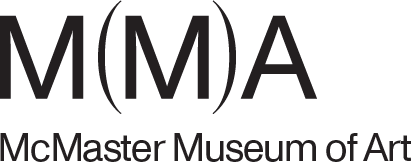

ABOUT THE COLLECTIONS
The McMaster Museum of Art houses McMaster University’s permanent collection of more than 7 500 objects that encompass the history of art from the late 15th to the 21st century, and coins and antiquities from Mediterranean cultures and China.
Collection development reflects the MMA’s current strategic plan with an emphasis on decolonial work and diversification.
The MMA is recognized internationally for its specialist collection of early twentieth-century German prints and outstanding European paintings, drawings and prints, including a donation by Hamilton businessman Dr. Herman Herzog Levy O.B.E. of his own private collection.
There are also significant holdings of Indigenous, Inuit, and Canadian art, especially since c.1960.
Acquisitions to McMaster’s permanent collection are administered by the MMA Curatorial team and Acquisitions Committee. Acquisitions policies emphasize the relationship between the teaching of art, art history and other subject areas, as well as broader concerns such as learning, research and public enjoyment.
All of our 7 500+ works of art are not on display at all times. Please consult our website for current exhibitions.
Moratorium on Donations
The McMaster Museum of Art is presently in a collecting moratorium and is not accepting donations of art at this time. Donations will be welcomed and reviewed at a future date which will be posted on our website.
The museum remains committed to our collecting priority in the continued support of early career, mid-career and established Indigenous artists, artists of the Black diaspora and racialized artists through purchases and commissions.
Statement on Evolving Cataloguing Practices
The McMaster Museum of Art is committed to the ongoing work required to learn, review, improve, and revise language and practices relating to the cataloguing of artwork and objects in a way that is inclusive and accurate. This statement is a first step toward these larger goals and frames our collective commitment to an authentic reckoning with our past and an active stance toward doing better for the future.
Historically, the M(M)A has catalogued and described works according to standardized, western colonial museum practices. We acknowledge that some of the language used throughout the collection database may be inaccurate or harmful and contribute to perpetuating discrimination and cultural bias. As such we are in the process of learning and implementing ethical cataloging practices so that we can more accurately describe works in our collection, and redress historical inequities and injustices in the ways language is used.
Our catalogue is meant to best describe and represent our collections in order to facilitate access to our shared cultural record. This is important and extensive work that will take time, and we recognize that terminology is continually evolving. We commit to this ongoing practice remaining a top priority in our collection management department.
We welcome feedback. If you encounter any problematic language or practices in the M(M)A collection, please contact us at museum@mcmaster.ca





